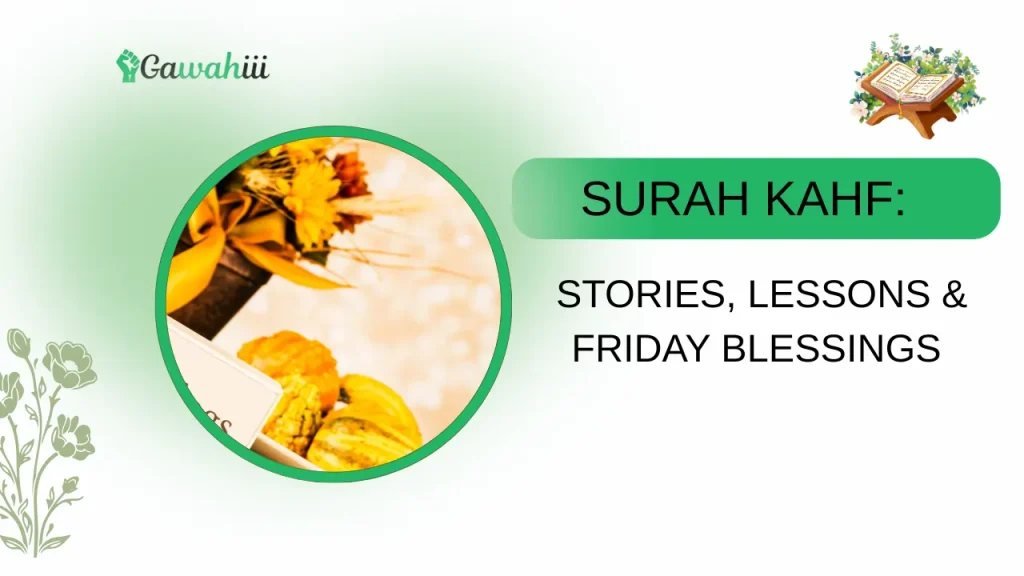Introduction
As our world speeds up and life gets more complicated, the Qur’an’s teachings continue to guide us. Among the most important chapters of the Quran is Surah Kahf, its 18th chapter, which is known for its amazing stories and advice that remain important today, as they deal with faith, wealth, knowledge, and power.
In this article, we go beyond the surface to examine the deeper meanings and stories of Surah Kahf. This guide will provide useful information as you explore why it is recited on Fridays, wonder at the wisdom hidden in its stories, or try to see how it can change your life.
After finishing this guide, you will have a clear sense of what Surah Kahf means and how you can put those teachings into practice in your life. We will reflect, learn new things, and grow spiritually on this path.
What Is Surah Kahf?
The Cave is the eighteenth chapter of the Holy Qur’an, made up of 110 verses. It was revelations from the time in Mecca, and it talks about going through hardship, being patient, and learning divine wisdom.
Key Points:
- Arabic Name: الكهف (Al-Kahf)
- Translation: The Cave
- Number of Verses: 110
- Place of Revelation: Mecca
- Main Themes: Challenges, believing in Allah, and protection against the False Messiah.
Core Stories in Surah Kahf:
- The People of the Cave (Ashab al-Kahf)—a story about young people who ran away to preserve what they believed.
- The Owner of the Two Gardens—a parable that talks about the danger of wealth and pride.
- The story of Musa (AS) and Khidr (AS) is about being humble and wise.
- He was famous for his power and the ways he used it for good and to protect others from evil.
These stories use symbols that remind us of the issues we experience today.
The Virtues and Benefits of Surah Kahf
While Surah Kahf tells a story from the past, it also provides many spiritual rewards. The Prophet ﷺ highly recommended saying it often, according to Hadiths.
Prophetic Sayings:
- Protection from Dajjal: The Prophet ﷺ said that memorizing the first ten verses of Surah Kahf will save a person from the impact of the Dajjal. (Sahih Muslim)
- Light for the Week: If anyone reads Surah Kahf on a Friday, they will be surrounded by His light until the next Friday comes. (Al-Hakim)
Benefits of Recitation:
- It radiates spiritual light into our world, which is often full of darkness.
- Has the power to guard us against difficulties, especially before Doomsday.
- Strengthens your relationship with the Qur’an, especially when done on Fridays.
- Allows the reciter to think and consider the spiritual aspects of life.
When to Recite:
- It is best to recite between the last part of Thursday and the beginning of Friday sunset each week.
The Story of the People of the Cave
The main tale behind Surah Kahf’s name is the adventure of Ashab al-Kahf, a young men who sought safety in a cave to avoid religious oppression.
Highlights of the Story:
- Believing in one God was not practiced in the society where these youths lived.
- They found a cave to hide in and asked Allah for mercy.
- Allah let them rest inside the cave for more than 300 years.
- Their miracle was shown clearly when Allah woke them after 300 years.
Key Lessons:
- Faith requires sacrifice.
- Young people can create big changes if they act with sincerity.
- Allah does not measure time in the same way that humans do.
Symbolic Meanings:
- A cave is often seen as a place to withdraw from life for spiritual thought.
- Their deep sleep represents Allah’s power over when a person lives or dies.
The Parable of the Two Gardens
The parable in Surah Kahf talks about a man who has abundant gardens and fruit, but he becomes so proud that he forgets Allah.
Story Summary:
- Having a lot, the rich man brags in front of his poorer friend and taunts him for his poverty.
- He refuses to accept the idea of judgment day and behaves proudly.
- Allah used the destruction of his gardens to remind everyone about His might.
Lessons and Morals:
- Getting rich is only a trial, not a sign of being successful.
- Gratitude is essential.
- Our property can be taken away by Allah anytime.
- Believing in one Allah is the basis of humility.
The Journey of Musa (AS) and Khidr (AS)
The meeting between Prophet Musa (AS) and Khidr (AS), a blessed servant of Allah with divine understanding, is one of the captivating parts of Surah Kahf.
Summary of Events:
- Musa (AS) decides to look for Khidr (AS).
- Khidr performs seemingly unjust actions:
- Damages a boat.
- Kills a young boy.
- He restores a part of a wall that separates hostile people.
- Musa did not know at first why Khidr did each of these things.
Spiritual Insights:
- Allah’s wisdom transcends human understanding.
- Believe in what God decides, even if you do not agree with it.
- Remaining calm even when you do not understand things.
Applicable Lessons:
- What looks like a setback can be a blessing you do not see.
- Knowledge requires humility and patience.
Dhul-Qarnayn and the Wall of Gog and Magog
The last story in Surah Kahf is dedicated to Dhul-Qarnayn, a fair and powerful leader who went to various
Highlights:
- He moved east and west, giving everyone a chance to experience justice.
- He noticed that people in those places were victims of Gog and Magog’s evil.
- He erected a huge wall made of iron and melted copper to prevent them from coming out.
Interpretations and Themes:
- Power needs to be directed by justice.
- God’s backing is very important for those in leadership.
- Gog and Magog are a sign of the struggles that come before the Day of Judgment.
Modern Relevance:
- Being just and humble, as Dhul-Qarnayn was, is a good example for modern-day leaders.
- Gog and Magog will come at the time of important signs before the Day of Judgment in Islam.
Surah Kahf and the End Times (Dajjal)
This surah is strongly linked to the issues and events of Islamic eschatology, especially the coming of Dajjal.
Why is Surah Kahf a Protection from Dajjal?
It Shows Us How to Handle Trials in:
- Faith (Ashab al-Kahf)
- Wealth (Two Gardens)
- Knowledge (Musa and Khidr)
- Power (Dhul-Qarnayn)
- People will be put to the test by Dajjal in each of these areas.
Practical Tips:
- Make an effort to remember the surah’s first and last ten verses.
- Reflect deeply on their meanings.
- Increase your spiritual strength by often saying Surah Kahf.
Surah Kahf and Personal Reflection
Surah Kahf talks about history, but it also reveals things about our personal lives and decisions.
Reflective Questions:
- What is my reaction when I have money or lose money?
- Do I react with humility when I don’t understand certain things?
- Do I take time alone to talk with my Creator?
- Do I give others what is fair when I have the chance to decide things?
Spiritual Practices:
- Journal reflections after Friday recitations.
- Study circles to dig more into the meanings.
- Praying to God about the main ideas in the Surah.
Tafsir Resources for Deeper Understanding
You need tafsir, or exegesis, to fully appreciate what Surah Kahf is saying, which is more than just a literal translation.
Recommended Tafsir Books:
| Resource Name | Author | Language | Description |
| Tafsir Ibn Kathir | Ibn Kathir | Arabic/English | Classical and widely respected |
| The Study Quran | Seyyed Hossein Nasr | English | Philosophical and contextual |
| Ma’ariful Qur’an | Mufti Shafi Usmani | English/Urdu | Comprehensive Hanafi perspective |
Online Platforms:
- Bayyinah TV—in-depth explanation of the Qur’an’s language.
- Alim.org—multilingual tafsir database
- You can use Quran.com to read both the translation and tafsir for every verse.
Tips to Incorporate Surah Kahf into Your Life
Actionable Advice:
- Plan to recite Surah Kahf weekly every Friday by using a reminder.
- Let the recitation play as you travel or work on everyday chores.
- Create a habit of noting down what you learn each week.
- Try to remember some of the verses bit by bit, and begin with the first ten.
- Talk about its lessons with friends or relatives in your meetings or gatherings.
Benefits of Incorporation:
- Strengthens spiritual resilience.
- Brings you closer to the meaning of the Qur’an.
- Provides weekly spiritual renewal.
FAQs
Why is Surah Kahf recited by Muslims on Fridays?
It is recommended that Muslims recite Surah Kahf on a Friday because Hadiths mention it brings spiritual benefits and lasting protection until the next Friday.
In Surah Kahf, how many stories are there?
Each of the four major stories stands for a certain kind of test. Faith, wealth, knowledge, and power.
What are the first 10 ayahs in Surah Kahf?
They are the first part of the surah that praises Allah and talks about the Qur’an. If they are memorized, they give you safety from Dajjal.
Was Surah Kahf revealed in Mecca or Medina?
Because it is a Makki Surah, it was sent down while the Prophet was in Mecca.
Children can also gain positive things from learning about Surah Kahf.
Yes, because the stories about faith and patience are easy for children to understand and have lessons that never expire.
Conclusion
Surah Kahf is a chapter that gives us wisdom, light, and important guidance. Besides being stories, they guide us spiritually through the challenges we encounter in life. If you are going through hard times, dealing with money, seeking to learn, or leading others, Surah Kahf has lessons that are still useful now.
Every Friday, make sure to read, meditate on, and follow the guidance presented in Surah Kahf. Making a habit of this will help preserve you from the struggles of Dajjal, as well as increase your bond with Allah and the Qur’an.







